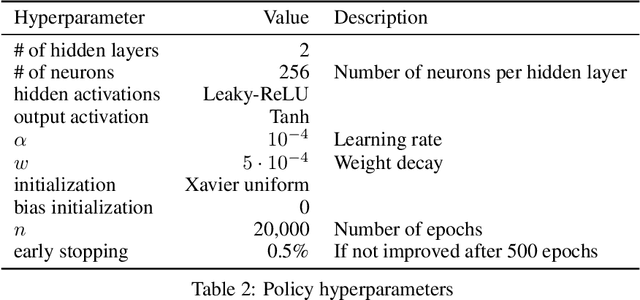Francesco Corman
Ride-Sourcing Vehicle Rebalancing with Service Accessibility Guarantees via Constrained Mean-Field Reinforcement Learning
Mar 31, 2025Abstract:The rapid expansion of ride-sourcing services such as Uber, Lyft, and Didi Chuxing has fundamentally reshaped urban transportation by offering flexible, on-demand mobility via mobile applications. Despite their convenience, these platforms confront significant operational challenges, particularly vehicle rebalancing - the strategic repositioning of thousands of vehicles to address spatiotemporal mismatches in supply and demand. Inadequate rebalancing results in prolonged rider waiting times, inefficient vehicle utilization, and inequitable distribution of services, leading to disparities in driver availability and income. To tackle these complexities, we introduce scalable continuous-state mean-field control (MFC) and reinforcement learning (MFRL) models that explicitly represent each vehicle's precise location and employ continuous repositioning actions guided by the distribution of other vehicles. To ensure equitable service distribution, an accessibility constraint is integrated within our optimal control formulation, balancing operational efficiency with equitable access to the service across geographic regions. Our approach acknowledges realistic conditions, including inherent stochasticity in transitions, the simultaneous occurrence of vehicle-rider matching, vehicles' rebalancing and cruising, and variability in rider behaviors. Crucially, we relax the traditional mean-field assumption of equal supply-demand volume, better reflecting practical scenarios. Extensive empirical evaluation using real-world data-driven simulation of Shenzhen demonstrates the real-time efficiency and robustness of our approach at the scale of tens of thousands of vehicles. The code is available at https://github.com/mjusup1501/mf-vehicle-rebalancing.
Safe Model-Based Multi-Agent Mean-Field Reinforcement Learning
Jun 29, 2023



Abstract:Many applications, e.g., in shared mobility, require coordinating a large number of agents. Mean-field reinforcement learning addresses the resulting scalability challenge by optimizing the policy of a representative agent. In this paper, we address an important generalization where there exist global constraints on the distribution of agents (e.g., requiring capacity constraints or minimum coverage requirements to be met). We propose Safe-$\text{M}^3$-UCRL, the first model-based algorithm that attains safe policies even in the case of unknown transition dynamics. As a key ingredient, it uses epistemic uncertainty in the transition model within a log-barrier approach to ensure pessimistic constraints satisfaction with high probability. We showcase Safe-$\text{M}^3$-UCRL on the vehicle repositioning problem faced by many shared mobility operators and evaluate its performance through simulations built on Shenzhen taxi trajectory data. Our algorithm effectively meets the demand in critical areas while ensuring service accessibility in regions with low demand.
 Add to Chrome
Add to Chrome Add to Firefox
Add to Firefox Add to Edge
Add to Edge